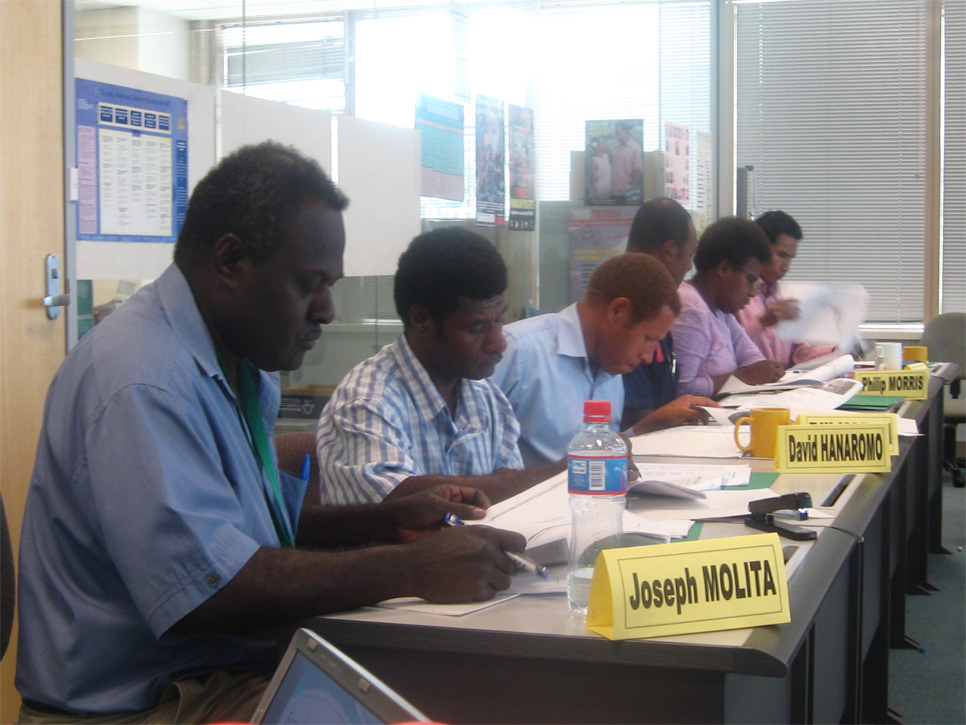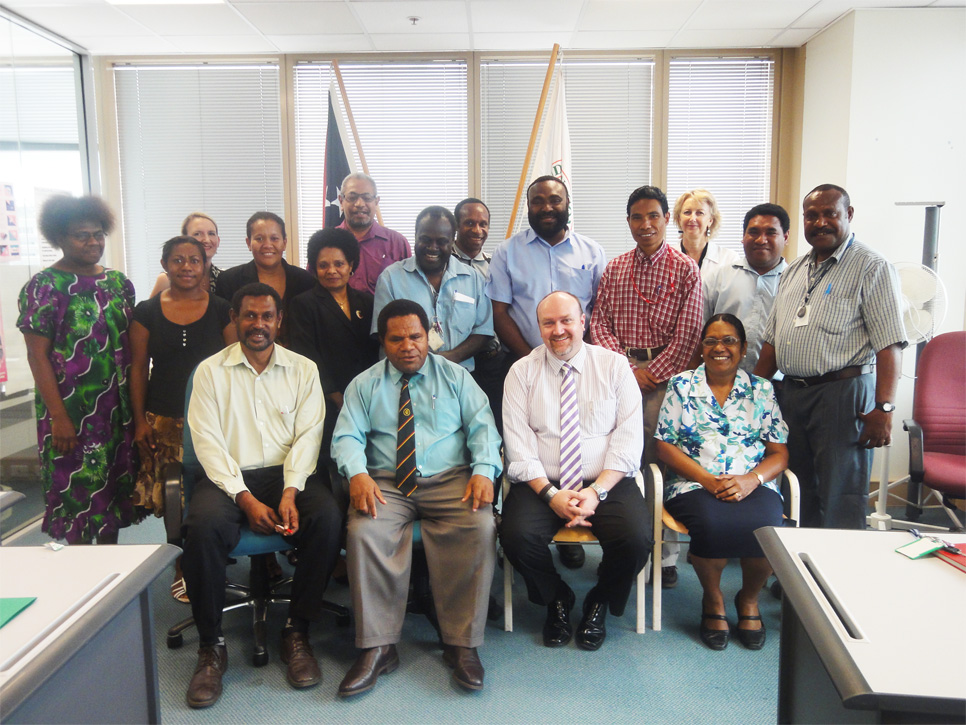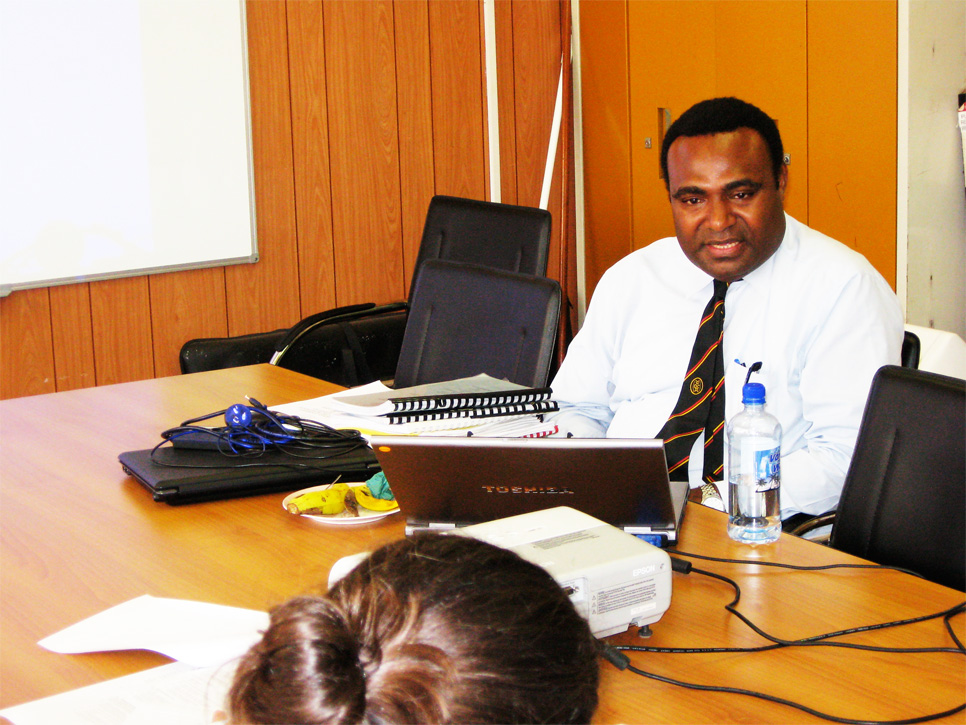Annual Report 2010-11 | Chapter 7
Chapter 7
Engagement
In 2010–11 the Ombudsman’s office implemented a series of roundtables, delegations, public speaking engagements and community event outreach with the defined purpose of:
- building and maintaining general public awareness of our services
- enhancing the accessibility of our services and relevance of our work among identified communities and sectors
- sharing learning experiences and tackling common problems with other government integrity agencies, other ombudsman schemes and complaint-handling agencies
- promoting good ombudsmanship regionally and internationally.
This chapter outlines some of these activities and achievements in 2010–11.
Community engagement
Homeless people
Our office has conducted fortnightly complaint clinics at major frontline service delivery centres for homeless people in Adelaide, Brisbane and Sydney. Our office was also an active collaborator with Homeless Connect Australia. In the past year, we have participated in the Homeless Connect Program in Brisbane and Sydney.
Gender equity and access
In May 2011, the Commonwealth Ombudsman opened a new outreach facility in association with South Australia’s Women’s Information Service.
Staff from both our office and the South Australia Ombudsman’s office have attended the Women’s Information Service shopfront in Grenfell Street, Adelaide every Friday morning fortnightly to enable women from a wide variety of communities to speak to qualified complaints officers in person or through the Women’s Information Service free-call telephone number.
The Women’s Information Service is a resource for women across the State and is a gatekeeper organisation with considerable links with regional and remote communities, as well as isolated and disadvantaged groups such as newly arrived migrants.
Aboriginal and Torres Strait Islander people
In the past year, investigation officers from the office have visited Kulaluk, Darwin town camp Maningrida, Alice Springs town camps and numerous communities in the Victoria River Region of the Northern Territory to conduct community consultations and complaint clinics as the oversight agency for the Government’s NTER/Closing the Gap program initiatives. Our staff also attended the Garma Festival in August 2010, taking our brand and services to the largest annual cultural gathering of Indigenous people in the NT.
Staff from our Brisbane office worked with the Queensland Ombudsman’s office to present an information booth at the NAIDOC Week Family Fun Day in July 2010, while our Sydney office attended the NSW Indigenous Rugby League Knock-Out as an exhibitor over the long weekend in October 2010 and conducted an information stall at the Greater Western Sydney Aboriginal Assistance Day, May 2011.
Our office continues to be an active member of the Good Service Forum in NSW. The Good Service Forum is a joint outreach program that delivers one-stop-shop engagement and education services to Aboriginal communities across the State. Working with other services on the ground in community outreach delivery helps people better understand our role and provides opportunities for on-the-spot referrals to appropriate agencies. In 2010–11 we travelled with the Good Service Forum to Muswellbrook, Coledale, Gunnedah and Guyra.
Other highlights
Other highlights of the 2010–11 outreach program include:
- visits to the Indian Ocean Territories (Cocos and Christmas Islands) and the Pilbara district of Western Australia through our partnership with the Regional Awareness and Access Program of WA
- Social Support Team roundtable discussions with community groups and other special interest groups in all State capital cities and the Australian Capital Territory
- visits to Defence Force establishments to highlight the Defence Force Ombudsman role
- information stalls and displays at major gay, lesbian, bisexual, transgender and intersex community festivals and other events promoting our services in view of the same sex reforms introduced in 2010
- outreach to students and other young people through a roadshow of Ombudsman services taken to 15 campuses in Queensland, NSW, Victoria and Tasmania during O-Week 2011 in association with our partners in the Australian and New Zealand Ombudsman Association
- representation at the World Refugee Day Community Festival (Brisbane) and African Summer Festival (Parramatta, NSW)
- distributing Commonwealth Ombudsman publications to relevant information outlets.
Administrative law prizes
In 2002 the Ombudsman’s office established the Australian National University (ANU) Jack Richardson Prize in Administrative Law. The prize recognises the contributions made by the first Commonwealth Ombudsman, who was also a former professor of law at the ANU. The annual prize is for the best essay by an undergraduate student in administrative law. The 2010 Jack Richardson Prize was awarded to Matthew Blunt.
In 2007–08 the office established the ‘Dennis Pearce Top Performance in Administrative Law Prize’ at the University of Canberra. The prize is named after former Commonwealth Ombudsman (and the first ACT Ombudsman) Professor Dennis Pearce, and is awarded to the student who receives the highest grade in the administrative law unit in the University of Canberra’s Law School. The 2010 winner was James Stanley.
Review and research bodies
Administrative Review Council
The Ombudsman is an ex officio member of the Administrative Review Council.
The Council provides advice to the government on administrative law issues and reform. In 2010–11 the Council has been undertaking a major project examining judicial review. The Council is conducting this inquiry of its own motion in accordance with its statutory functions under section 51 of the Administrative Appeals Tribunal Act 1975 (AAT Act).
While the Council has looked at aspects of judicial review a number of times in its past reports, this is the first time since the Administrative Decisions (Judicial Review) Act 1977 (ADJR) commenced in 1980 that the Council has considered the interaction between all of the sources of judicial review— constitutional judicial review, general statutory review under the ADJR Act and specific statutory review such as Part 8 of the Migration Act 1958 .
The Council expects to complete its review during the 2011–12 reporting year. Further information can be found in the Administrative Review Council Annual Report for 2011.
Whistleblowing
On 25 February 2009, the House of Representatives Standing Committee on Legal and Constitutional Affairs released its report on a preferred model for legislation to protect public interest disclosures within the Australian Government public sector. The government responded to the committee’s report on 17 March 2010 and accepted most of the committee’s recommendations. The recommendations included a role for the Commonwealth Ombudsman in the operation of the scheme.
Engaging internationally
The Commonwealth Ombudsman has a dedicated international program and cooperates in a range of activities to improve government administration, complaint handling and ombudsmanship on the international stage.
Our work is funded largely by AusAID.
Indonesia
In February 2011, we finalised the first phase of the Indonesian Australia Ombudsman Linkages and Strengthening program, which had been running since August 2006. By the time this activity was completed, Indonesia had a new organisation, the Ombudsman of the Republic of Indonesia (ORI), with legislated powers and responsibility for the supervision of the public service.
In February 2011, nine new Ombudsmen were appointed.
A highlight of our program in 2010–11 was a series of planning meetings in Jakarta. The discussions focused on the challenges that ORI faces in expanding its organisation into 33 regional offices. Our new program will include activities to assist with building ORI’s skills and structure to manage that rapid expansion.
Papua New Guinea
This year, our office and the Ombudsman Commission of Papua New Guinea (OCPNG) have continued to successfully complete a range of activities designed to strengthen the skills of the Commission’s staff and improve its processes and practices. Particular highlights include the following placements of OCPNG staff in Australia:
- Mr Geita Doura, Finance Manager, learning about financial processes and financial team management
- Ms Alexia Luke, IT Manager, discussing IT procurement and communications options
- Ms Lydia Mulina, Team Leader Government Business Liaison Program Unit, regarding agency liaison
- Mr Bonner Tito, Media and Communications Manager, learning about public affairs and media management
- Mr Dickson Morehari, Human Resources Manager, comparing human resource management in our office and in that of the New South Wales Ombudsman.

Staff of the OCPNG taking part in forensic accounting training run by a Commonwealth Ombudsman staff member in Port Moresby in September 2010
We were also very pleased to host the Secretary of the OCPNG, Mr Gabe Hekoi, in February 2011. Mr Hekoi holds a statutory position that provides the secretariat support to the Commission. During his visit to Canberra and Sydney, the Secretary was able to discuss the challenges of open and accountable government with staff in our office, and that of the Australian Information Commissioner, the Australian National Audit Office, and the Clerk of Parliament.
During 2010–11, our program moved into assisting the OCPNG with its responsibilities under the Leadership Code, which is a constitutional law that governs the behaviour of leaders in Papua New Guinea, including elected officials and senior public servants. As our office does not have a similar role, we co-ordinated discussions and placements with anti-corruption and integrity organisations across Australia. The initial visit by Mr Mathew Damaru, Director Leadership, in May 2011 to a variety of organisations has set a solid foundation for more work in this area.
Through the twinning program, Shaun Rohrlach, Director of Public Affairs for the Commonwealth Ombudsman, began placement work with OCPNG teams on a number of long-term communication priorities.
This included:
- planning for the implementation and promotion of a new toll-free number and integrated complaint-handling process for the Commission
- improved cross-team communication and coordination of promotion, outreach and education activities
- planning for the full development of an integrated communications and outreach strategy
- promotion of the Commission’s activities in the area of human rights in prisons and oversight of the PNG Police Force.
Work on these projects, including the mentoring of communication projects as part of a policy and program development program, will continue into the next reporting period.
Ombudsman Nero (seated, second from left), Shaun Rohrlach – Director of Public Affairs, Commonwealth Ombudsman (seated, second from right) and staff of the Ombudsman Commission PNG.
Pacific
Our office provides the secretariat support to the Pacific Ombudsman Alliance (POA). The POA’s activities and management are funded by AusAID under a four-year agreement. We are now half-way through the four-year consolidation phase, with the Alliance becoming a recognised voice of Pacific ombudsmen and an organisation of expertise in developing complaint handling in the Pacific.
The Alliance is governed by an engaged and active Board, including Ombudsmen from the Cook Islands, New Zealand, and New South Wales. Annual members’ meetings are held to plan the direction and priorities of the Alliance for the coming year. This year, the meeting was hosted by Mr Joe Poraiwai, the Solomon Islands Ombudsman, in conjunction with the 30th anniversary of his office. During the meeting, members discussed and revised POA’s long-term strategy and plans.
A very positive aspect of the Alliance’s work has been increased co-operation and assistance directly between members. In December 2010 the Counsel to OCPNG, Mr Vergil Narakobi, was able to assist the Vanuatu Ombudsman in planning changes to the Vanuatu leadership code. The OCPNG’s experience
in the practical management of its leadership code was invaluable in the Vanuatu discussions.
Counsel to the OCPNG, Mr Vergil Narakobi, explaining the workings of the PNG Leadership Code to staff of the Vanuatu Ombudsman’s office in Port Vila
In September 2010 POA sponsored a visit by the newly appointed Ombudsman from Palau, Mr Lucio Ngiraiwet, to the Solomon Islands for discussions with the Solomon Islands Ombudsman and Leadership Code Commissioner. Mr Ngiraiwet received first-hand advice and experiences from Mr Poraiwai on becoming an effective Ombudsman in a developing island state.
Future directions
As our office becomes more experienced in its international work, we are increasingly sharing our experience with other Australian government agencies, and providing more input into the development of Australia’s aid policy. In the future, we plan to increase integration not only between our partners in Indonesia and the Pacific, but also with other relevant Australian government agencies, non-government organisations and our counterpart organisations in the States and Territories.
Australasia and Pacific Ombudsman Region
The Ombudsman is also a member of the Australasia and Pacific Ombudsman Region (APOR), a sub-region of the International Ombudsman Institute. The APOR annual conference was hosted this year by the Control Yuan of Taiwan in Taipei. At the meeting, members agreed in principle to share their training documents, if relevant to other members. In particular, members are interested in practical training projects and sharing other Ombudsmen’s working experiences. APOR is also undertaking a comparative study analysing the legal basis of ombudsman institutions in the APOR region.
The next APOR conference will be held in conjunction with the International Ombudsman Institute conference in New Zealand in November 2012.
